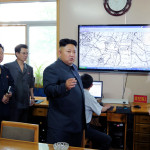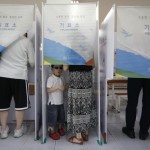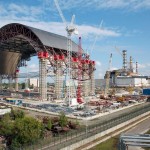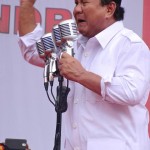- DETERRENCE: China to Hold Second Nuclear Security Drill in 2015
- DPRK: Exposed: North Korea’s New Anti-ship missiles and 130 kilometer range are a big threat to South Korea
- GOVERNANCE AND CIVIL SOCIETY: Location, Location, Some Frustration
- ENERGY SECURITY: The Right Lessons from Chernobyl
- AUSTRAL PEACE AND SECURITY: The Blunder Down Under
 DETERRENCE: China to Hold Second Nuclear Security Drill in 2015, Xinhua, May 12, 2014
DETERRENCE: China to Hold Second Nuclear Security Drill in 2015, Xinhua, May 12, 2014
China will hold national nuclear security exercise in Guandong. A 2005 study of a spent fuel pool attack showed radiation danger of acute death up to 6km off site. Its nuclear security rules are outdated. It will open a nuclear security training center in 2015. It did not sign the Strengthening Nuclear Security Implementation pledge at the 2014 Nuclear Security Summit.
- Why China should observe the Nuclear Security Summit pledge, Hui Zhang, Bulletin of the Atomic Scientists, April 21, 2014sylph21
- China-U.S. nuclear security center opens next year, Xinhua, March 24, 2014
- Consequence Assessment of Attacking Nuclear Spent Fuel Pool By Terrorist, Q. Y. Zheng, et al. Radiation Protection (in Chinese), January 2005 [PDF, 0.2MB]
 DPRK: Exposed: North Korea’s New Anti-ship missiles and 130 kilometer range are a big threat to South Korea, Sina.com Military News, (9 June 2014) [Chinese language]
DPRK: Exposed: North Korea’s New Anti-ship missiles and 130 kilometer range are a big threat to South Korea, Sina.com Military News, (9 June 2014) [Chinese language]
North Korea does seem to be boosting its conventional deterrence capabilities. Somehow, North Korea appears to have made a weapons system very similar to the Russian SSN-25 SWITCHBLADE. Ships with that system and KH-35 missiles can reach out to 130 kilometers which threatens both China and China’s economic partner South Korea. However, overall North Korea remains quiet. The reason for the relative quiet is unclear. The relative quiet may be due to preparations for the end of the mourning period for Kim Jong-il in six months which should be accompanied by some spectacular displays between 18 December 2014 and 15 April 2015 which marks the period between the end of the three year mourning period for Kim Jong-il and the birth of Kim Il-sung.
- Joint MFA-MHA Press Statement in response to media queries about the criminal charges filed against the Singapore-registered company Chinpo Shipping Company (Private) Limited. Singapore Ministry of Foreign Affairs (10 June 2014)
- North Korea to begin integrated production and marketing of LED lights and other energy products. CRI online (China Radio International). (9 June 2014) [Chinese-language]
- Dangerous Conspiracy, Sim Chol Yong, Rodong Sinmun (North Korea Workers Daily). (9 June 2014)
 GOVERNANCE AND CIVIL SOCIETY: Location, Location, Some Frustration, S.C.S., The Economist (5 June 2014)
GOVERNANCE AND CIVIL SOCIETY: Location, Location, Some Frustration, S.C.S., The Economist (5 June 2014)
ROK local elections were expected to serve as a referendum on the ruling party for its handling of April’s ferry sinking, but results show voters continuing to vote along regional lines and key posts split between major parties. However, the opposition party won a surprising majority of education superintendent posts on a shared platform of reforms, one of the few votes showing public dissatisfaction following the ferry accident.
- Liberals sweep education races on shared platform of reforms, Kim Hee-jin, Joongang Ilbo (6 June 2014)
- Highest voter turnout in 19 years, Chosun Ilbo (5 June 2014)
 ENERGY SECURITY: The Right Lessons from Chernobyl, Editorial Board, New York Times (1 May 2014)
ENERGY SECURITY: The Right Lessons from Chernobyl, Editorial Board, New York Times (1 May 2014)
The NY Times opines, without a basis in fact, that nuclear accidents have occurred to date “do not compare to the damage to the earth being inflicted by the burning of fossil fuels.” As if Chernobyl costs to date are chump change and as if nature has no adaptability that scientists do not yet know. Meanwhile, “decontamination costs alone in the Fukushima residential area could balloon to as much as $600 billion.”
- Chernobyl: capping a catastrophe, Henry Fountain. New York Times (27 April 2014)
- At Chernobyl, hints of nature’s adaptation, Henry Fountain. New York Times (5 May 2014)
- Insight: Japan’s “Long War” to shut down Fukushima, Mari Saito, Kiyoshi Takenaka and James Topham, Reuters (8 March 2013)
 AUSTRAL PEACE AND SECURITY: The Blunder Down Under, Jacqueline Baker, ANU College of Asia and the Pacific (4 June 2014)
AUSTRAL PEACE AND SECURITY: The Blunder Down Under, Jacqueline Baker, ANU College of Asia and the Pacific (4 June 2014)
Even if Widodo holds his poll lead to succeed SBY on 9 July, the reality is the Indonesia-Australia hinge of the pivot is almost broken. Knowing less and less about Indonesia, Australians regard Indonesia less warmly than China, “our best friend in Asia”. A re-set of defence cooperation and a face-saving (for Australia) intelligence agreement await the election winner, as does Indonesia’s China-US policy. Meanwhile, PM Abbott looks for a climate change deniers’ alliance.
- Australians remain wary of Indonesia, Lowy Institute foreign policy poll reveals, Catherine McGrath, ABC News (4 June 2014)
- Prabowo and the art of being tegas, Dominic Berger, Indonesia Votes, New Mandala (27 May 2014)
- Tony Abbott seeks alliance to thwart President Obama on climate change policy, Mark Kenny, The Age (10 June 2014)
The Nautilus Peace and Security Weekly Report presents articles and full length reports each week in six categories: Austral security, nuclear deterrence, energy security, climate change and security, the DPRK, climate change adaptation and governance and civil society. Our team of contributors carefully select items that highlight the links between these themes and the three regions in which our offices are found—North America, Northeast Asia, and the Austral-Asia region.
- Subscribe to NAPSNet to receive free weekly email reports editor:
Contributors:
- Deterrence: Peter Hayes
- Governance and Civil Society: Dyana Mardon
- Climate Change Adaptation: Saleem Janjua
- DPRK: Roger Cavazos
- Austral Peace and Security: Richard Tanter

